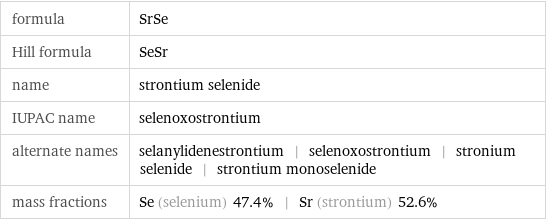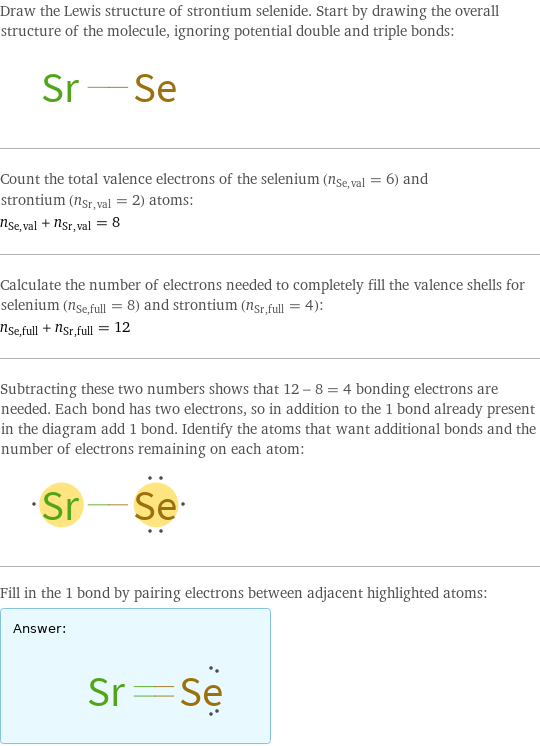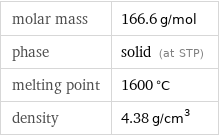Input interpretation

strontium selenide
Chemical names and formulas

formula | SrSe Hill formula | SeSr name | strontium selenide IUPAC name | selenoxostrontium alternate names | selanylidenestrontium | selenoxostrontium | stronium selenide | strontium monoselenide mass fractions | Se (selenium) 47.4% | Sr (strontium) 52.6%
Lewis structure

Draw the Lewis structure of strontium selenide. Start by drawing the overall structure of the molecule, ignoring potential double and triple bonds: Count the total valence electrons of the selenium (n_Se, val = 6) and strontium (n_Sr, val = 2) atoms: n_Se, val + n_Sr, val = 8 Calculate the number of electrons needed to completely fill the valence shells for selenium (n_Se, full = 8) and strontium (n_Sr, full = 4): n_Se, full + n_Sr, full = 12 Subtracting these two numbers shows that 12 - 8 = 4 bonding electrons are needed. Each bond has two electrons, so in addition to the 1 bond already present in the diagram add 1 bond. Identify the atoms that want additional bonds and the number of electrons remaining on each atom: Fill in the 1 bond by pairing electrons between adjacent highlighted atoms: Answer: | |
Basic properties

molar mass | 166.6 g/mol phase | solid (at STP) melting point | 1600 °C density | 4.38 g/cm^3
Units

Solid properties (at STP)

density | 4.38 g/cm^3
Units

Thermodynamic properties

specific heat of formation Δ_fH° | solid | -2.316 kJ/g molar heat of formation Δ_fH° | solid | -385.8 kJ/mol (at STP)
Chemical identifiers
![CAS number | 1315-07-7 PubChem CID number | 14619133 PubChem SID number | 24880825 SMILES identifier | [Se]=[Sr] InChI identifier | InChI=1/Se.Sr/rSeSr/c1-2 MDL number | MFCD00054059](../image_source/791925e3cd8b1fbe6d36fc2d648c2d59.png)
CAS number | 1315-07-7 PubChem CID number | 14619133 PubChem SID number | 24880825 SMILES identifier | [Se]=[Sr] InChI identifier | InChI=1/Se.Sr/rSeSr/c1-2 MDL number | MFCD00054059